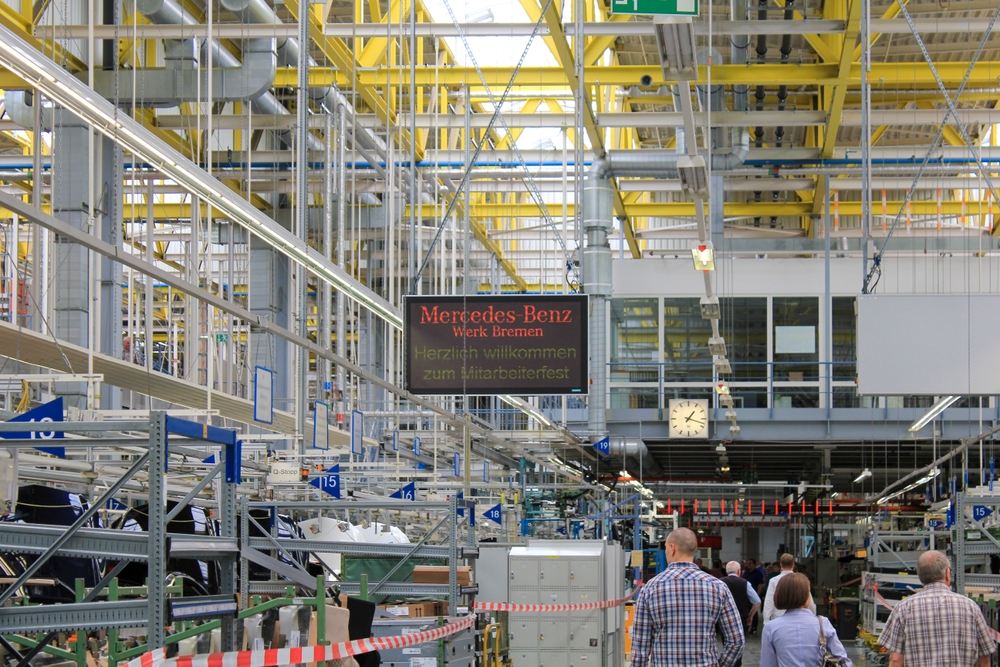Labor-management cooperation in Germany

In a closely contested election in May of 2024, the approximately 5,000 workers at a Mercedes-Benz plant in Tuscaloosa, Alabama, voted against certifying the United Auto Workers of America (UAW) as their bargaining agent. The UAW’s narrow defeat followed its recently successful certification election for recognition at a Volkswagen plant in Chattanooga, Tennessee.
Shortly after the loss, the UAW filed a complaint with the National Labor Relations Board alleging that Mercedes had committed unfair labor practices leading up to the election. The UAW also took the unprecedented step of filing a complaint in Germany alleging violations of the German Act on Corporate Due Diligence Obligations in Supply Chains. That law requires German companies to adhere to 11 internationally recognized human rights standards, including the right to free association, when outsourcing production abroad. If found liable, Mercedes could be subject to significant financial penalties. The complaint has prompted the German government to launch an investigation into Mercedes’ handling of the certification election as well as sparked interest by the current U.S. administration.
Mercedes actively campaigned against the UAW in the run-up to the certification election at its Alabama plant. Reports filed with the Department of Labor’s Office of Labor-Management Standards revealed Mercedes directly hired at least three outside labor consultants (including Road Warrior Productions, BJC & Associates and Employer Labor Solutions) who then deployed a dozen additional consultants from around the country to resist the UAW’s efforts. We won’t know how much Mercedes spent in these efforts until it and its consultants file their annual reports, 90 days after the close of their respective fiscal years.
In contrast to its actions in Alabama, Mercedes routinely recognizes and cooperates with the UAW’s counterparts in Germany, as do virtually all large German corporations. Trade unions in Germany play a significant role in the functioning of the economy and society. The main labor federation is the German Confederation of Trade Unions (Deutscher Gewerkschaftsbund, or DGB), an umbrella labor organization consisting of eight separate trade unions representing 5.7 million workers in varying industrial sectors. German law not only enforces the right to free association for German workers, it requires that companies with 2,000 or more employees allow their employees to elect up to half the members of the company’s board of supervisors, giving workers a significant role in how these companies are run.
Although collective bargaining can occur in Germany between a trade union and a single employer, it is most often conducted between large trade unions and associations of employers, reaching an agreement that covers entire industrial sectors within a region. Rates of pay, leave, benefits and working conditions are traditionally negotiated industry-region wide in Germany, so employees at companies within an industrial sector in a specific region receive comparable pay and benefits.
On-site labor relations are usually handled by “works councils,” a set of employees elected by the company’s workforce. Works councils are required under German law for employers with more than five employees when requested by the employees and certified through an election. Works councils have extensive influence, with a role in making sure employment laws are implemented, protecting labor rights, hiring new employees, terminating contracts properly and even determining the office layout. The number of employees on the council is proportional to the number of employees at the company. Works councils do not have to include union members, and even employers without unionized employees often have works councils.
These different approaches to worker representation have, not surprisingly, produced different results for workers. Although union membership in Germany has been declining, it far surpasses U.S. union membership. Forty-three percent of German workers work under negotiated collective bargaining agreements compared with roughly 10% in the U.S. As a direct consequence of the German labor movement’s role in the economy, German workers across industries (whether or not represented by a union) are entitled to 20 days of paid annual leave; at least 6 weeks of paid sick leave, and maternity and parental leave; and a contributory pension system, in addition to Germany’s equivalent of Social Security. While benefits like these are typically available to U.S. workers represented by unions, they are far from the norm in the broader economy.
In blog posts to follow, we will review the role unions play in other parts of the world.
J. Matthew McCracken, a senior trial attorney in the department’s Office of the Solicitor, is currently serving on detail to the Office of Labor-Management Standards.
Koebel.Tiffany…
Wed, 09/18/2024 – 10:00


Comments are closed.